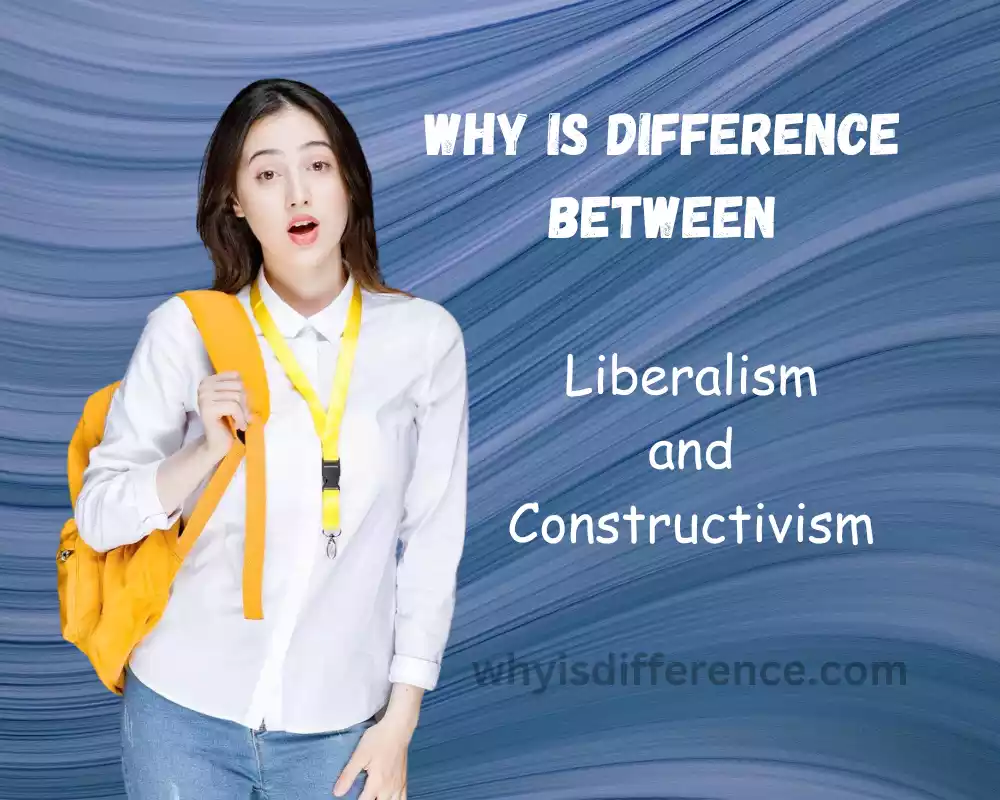Liberalism and Constructivism: Many theories have been proposed in the study of international relations. These theories provide a new perspective on international relations. The most popular theories are constructivism, realism, and liberalism. In this article, we will focus on liberalism and constructivism to try and explain their differences by highlighting their features.
Liberalism

- Liberalism is a political philosophy and economic system which emphasizes individual liberty, equality and rights. Originating during the 17th-18th centuries as a reaction against authoritarian regimes dominating Europe at that time, liberalism’s core values include freedom, democracy and tolerance.
- Liberals promote representative democracy as a means to balance power among individuals or groups, and promote separation between branches of government. Liberalism also endorses free markets while advocating that government only intervene in specific situations.
- Liberal philosophy places high regard on human and civil liberties, such as freedom of religion and association, privacy, due process and due process rights. Liberalism thus acts as an inclusive philosophy which seeks to promote individual dignity and wellbeing regardless of race, gender or social status.
Constructivism

- Constructivism is an approach to theory that emphasizes the role of ideas, identities, and norms in shaping political and social behavior. Constructivism was first developed during the 1980s in response to traditional liberal and realist approaches to International Relations that focused on states’ distribution and behavior as primary goals of this field of study.
- The constructivist approach holds that social and political realities are created through interactions among individuals and groups who interpret events and phenomena and give meaning to them. This view considers non-state actors such as international organizations, civil society groups, and transnational networks along with states as major sources for interpretation and meaning-giving.
- Constructivism emphasizes the significance of identity and norms in shaping behavior. Norms refer to shared expectations about acceptable behavior while identities refer to how individuals or groups define their relationship to one another; both of these elements influence states and other actors within the international system.
- Constructivism emphasizes the role of ideas and dialogue as key elements of its philosophy. Constructivists believe that ideas not only reflect power or interest relationships but can also alter them through expression or modification of them. Discourse or language exchange plays an integral part in creating social and political realities.
- Constructivism is a theory that places emphasis on ideas, norms and identities as key influences on political and social behavior, as well as being essential components for analyzing international relations.
Theoretical Underpinnings
Liberalism and constructivism differ substantially in their theoretical foundations, reflecting their disparate views about the nature and structure of international order.
- Liberalism’s roots can be found in the Enlightenment. During this era of progress and reason, individuals were granted more individual liberties. John Locke, Adam Smith, and other liberal theorists advocated for limited government powers and individual freedom to pursue their individual self-interests without interference by the government – in their view, this would improve society as a whole and promote economic development on free market economies.
- Immanuel KANT, a liberal theorist, proposed in international relations that representative democracies would lead to peace as democratic states tend not to fight among themselves. KANT also believed international law and institutions were essential in encouraging cooperation between states and resolving conflict between them.
- Constructivism emerged as an alternative approach to realist and liberal approaches dominating international relations in the 20th century, emphasizing social construction and interpretation as a means to influence the behavior of countries and other actors within an international system.
- Theorists from the Constructivist school, such as Alexander Wendt, contend that international order is more than simply an arrangement of states seeking their own interests; it’s a social construction formed through shared ideas, norms and identities among its participants. According to these constructivists, meanings understood and interpretations made about actor behavior by participants are just as essential if not more so than actual actions taken; these interpretations are shaped through interaction and communication within societies.
The contrast between constructivism and liberalism reflects their diverging views of international systems and individual actor’s roles within them. Liberal approaches emphasize individual freedoms and rights while democratic governance offers free markets; conversely, constructivism stresses social construction through identity formation and norm influence on behavior in social and political interactions.
Key Concepts
Here are a few key concepts associated with constructivism and liberalism:
- Liberalism
- Individual liberty refers to the idea that individuals should have the freedom in pursuing their interests freely without interference from others or from government authorities.
- An economic system built on supply and demand with minimal government involvement.
- Democracy refers to the concept that individuals should have their voices heard on how their country is run through representative institutions such as parliaments and elections.
- The idea is that all must adhere to uniform laws and procedures and that government cannot exercise unchecked power.
- Human rights refer to the idea that everyone has certain fundamental rights and liberties regardless of social standing, race or gender.
- Constructivism
- This philosophical view holds that social and political reality is created through interaction among individuals and groups rather than given.
- Norms are shared expectations and understandings regarding what constitutes acceptable behaviors, which ultimately have an influence on social and political behaviors.
- Identity is defined as how individuals and groups define themselves relative to other people and can impact both social and political behaviors.
- This concept asserts that language and ideas not only express power or interests but can also help shape these relations.
- Concept of people and groups being able to alter the social and political structures around them by making choices, as well as being affected by those choices.
Understanding the theories, their implications and the differences between liberalism and constructivism requires understanding these concepts.
Differences between Liberalism and Constructivism
Both constructivism and liberalism offer different viewpoints on international relations, including the roles played by individuals and institutions.
Below are some key distinctions between them:
- Liberals see the international system as being made up of self-interested countries that cooperate by creating international institutions and working towards common goals. Contrast that with constructivism’s view which sees it as being socially constructed by ideas, standards, and identities.
- This belief system places great value on how a strong state plays an integral part in upholding individuals’ freedoms and rights, economic development, and democracy. Constructivism on the other hand places less weight on state actors or ideas and more on non-state ones.
- Institutions play a central role in liberal ideology as a mechanism to foster cooperation and settle conflicts among countries. Constructivism contrasts this view, as institutions tend to be formed more by participants’ individual ideas and norms rather than independent actors.
- Constructivism places more importance on how identities and norms shape social and political behavior while liberalism gives less consideration to such factors in favor of individual self-interest.
- Liberal approaches to conflict see it as the result of state discord and believe it can be resolved by creating institutions and pursuing common interests. Contrast this with constructivism’s view that conflicts stem from social construction; for this approach conflict resolution depends on shifting ideas and identities in society.
Constructivism and liberalism represent two distinct perspectives on international affairs and their effects, as well as on individuals’ roles within institutions. While liberalism emphasizes personal liberties like freedom, democracy, and free markets; constructivism emphasizes norms, identities, and ideas to shape social and political behavior.
Comparison table:
| Inspact | Liberalism | Constructivism |
|---|---|---|
| View of Human Nature | Humans are rational individuals with self-interest and universal rights | Humans are social beings influenced by social norms, culture, and historical context |
| Role of the State | Advocates for limited government intervention in economic and social | Emphasizes the role of the state in shaping societal norms, values, and institutions |
| International System | Focuses on international cooperation, institutions, and free trade | Emphasizes the role of ideas, norms, and identities in shaping international politics |
| Security | Emphasizes the importance of military capabilities and deterrence | Believes security is achieved through building trust, cooperation, and shared understanding |
| International Law | Sees international law as an important | Recognizes the influence of international |
| framework for resolving disputes | norms and values on shaping international law and institutions | |
| Identity | Focuses on individual rights and freedom | Emphasizes collective identity, culture, and social identities as central to understanding international relations |
| Critique of Realism | Challenges realist emphasis on power politics and zero-sum game | Critiques realist assumptions of anarchy and self-interest in international relations |
Similarities between Liberalism and Constructivism
Constructivism and liberalism share some similarities, even though they represent two distinctly distinct theoretical approaches to international relations.
- Constructivism and liberalism both emphasize the necessity and significance of cooperation in international relations. While liberalism believes international institutions can aid states to work together more closely, constructivism places greater importance on norms, identities, and ideas as factors influencing cooperation.
- Both constructivism and liberalism recognize that international relations do not remain static and that constant change is part of international systems. Liberalism views change as an opportunity for cooperation and progress; constructivism emphasizes ideas and identities as important drivers of transformation.
- Both constructivism and liberalism recognize the centrality of rules and norms to shaping international behavior, with liberalism stressing international organizations and the rule of law while constructivism views norms as social constructions created through ideas.
- Both constructivism and liberalism acknowledge the vital role non-state agents play in shaping international relationships. The liberal theory sees non-state agents as partners who can help advance economic growth and democratic ideals; constructivism emphasizes their significance in shaping identities and norms.
- Both constructivism and liberalism place great significance on ideas and dialogue as integral components of international relations. Liberalists view ideas and dialogue as key tools for encouraging cooperation and resolving disputes; constructivism emphasizes their power in shaping identities and norms.
Although liberalism and constructivism exhibit distinct traits, they also share several similarities, such as an understanding of non-state actors, cooperation, change and norms in international relations.
Critiques of Liberalism and Constructivism
There are multiple approaches to distinguishing liberalism and constructionism:
Critiques of Liberalism
- Neglect of Power Dynamics. Critics allege that liberals’ focus on institutions and cooperation overlooks the dynamics of power at play within international relations; liberal theory fails to address how states use their resources for self-serving interests, according to these critics.
- Critics allege that liberalism’s focus is too often placed solely on individual rights and liberties while disregarding systemic inequality that exists within international systems. Liberalism fails to address issues like poverty, wealth disparity, and global power imbalances adequately.
- Critics contend that liberals oversimplify state behavior by presuming they will act rationally to advance their own self-interest. According to them, this overlooks domestic politics, cultural heritage, and historical legacies as factors that impact a state.
Critiques of Constructivism
- Critics contend that constructivism’s focus on ideas, identities, and norms makes its application hard to test empirically; critics assert that constructivists rely more heavily on anecdotal evidence rather than formal scientific research to support their arguments.
- Critics contend that constructivism fails to consider material considerations, such as economic interest, military power and geography that influence international relations. Furthermore, critics allege that constructivism does not provide sufficient explanation as to how certain ideas and norms come to dominate others.
- Critics assert that constructivism’s emphasis on ideas and norms makes coming up with concrete policy proposals difficult, according to critics of constructivism.
- Criticisms of constructivism and liberalism point out their limitations when explaining or responding to global challenges, yet both remain influential approaches in international relations.
Conclusion
Though liberalism and constructivism take divergent theoretical perspectives, they share one thing in common, an appreciation of the significance of cooperation, change, standards and non-state actors in shaping global politics. Liberalism emphasizes economic cooperation, individual rights and institutions while constructivism stresses ideas norms identities to influence global behavior. Both theories have been criticized for failing to explain or resolve complex global issues effectively but both remain essential tools in understanding international systems and making policy decisions.

